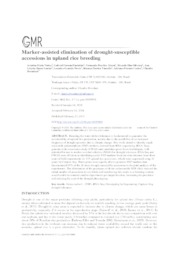Marker-assisted elimination of drought-susceptible accessions in upland rice breeding.
Marker-assisted elimination of drought-susceptible accessions in upland rice breeding.
Author(s): VIEIRA, A. F.; PANTALIÃO, G. F.; ABREU, F. M.; SILVEIRA, R. D.; GARCIA, A. L. B.; NEVES, L. G.; VIANELLO, R. P.; CASTRO, A. P. de; BRONDANI, C.
Summary: Breeding for water-deficit tolerance is fundamental to guarantee the sustainability of upland rice production, mainly due to the possibility of an increased frequency of drought episodes due to climate change. This work aimed to identify single nucleotide polymorphism (SNP) markers, derived from RNA sequencing (RNA-Seq), genome-wide association study (GWAS) and candidate genes from Arabidopsis, with potential for use in marker-assisted selection (MAS) for drought tolerance. RNA-Seq and GWAS were efficient in identifying useful SNP markers from the data obtained from three years of field experiments for 175 upland rice accessions, which were sequenced using 32 genes by Capture-Seq. Three genes were equally able to generate SNP markers that discriminated 95% of the 20 most drought susceptible accessions in the joint analysis of the experiments. The elimination of the genotypes with the unfavourable SNP allele reduced the initial number of accessions to one third, and transferring this result in a breeding routine, would enable to conduct smaller experiments per target location, increasing the precision and reducing the cost of the drought phenotyping.
Publication year: 2018
Types of publication: Journal article
Unit: Embrapa Rice & Beans
Observation
Some of Embrapa's publications are published as ePub files. To read them, use or download one of the following free software options to your computer or mobile device. Android: Google Play Books; IOS: iBooks; Windows and Linux: Calibre.
Access other publications
Access the Agricultural Research Database (BDPA) to consult Embrapa's full library collection and records.
Visit Embrapa Bookstore to purchase books and other publications sold by Embrapa.

